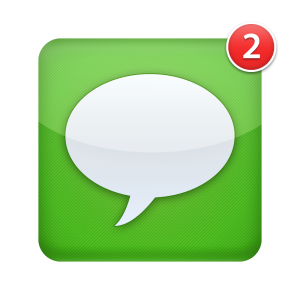Unified messaging simply means that you can read and reply to your messages from any device you happen to be using. You don’t have to stop writing a report on your laptop and pickup your phone to read & reply to messages. You should simply be able to reply from your laptop. Seems simple, right? However for most of us it doesn’t always quite work that way.
Why is unified text messaging so important? Texting is universal. It’s like email. SMS and MMS is a global standard that works with every modern phone everywhere. All you need is someone’s phone number to get in touch with them. There’s no sending a friend request and waiting for acceptance to contact someone. There’s no grandma doesn’t know how to use Facebook and accept my friend request so we can video chat on Messenger.
 iOS (Apple) has iMessage which works great syncing messages within the Apple ecosystem. If one of your devices isn’t made by Apple you’re out of luck using it to text. There is no good reason iMessage cannot be baked into the iCloud website just like all of Apple’s other services.
iOS (Apple) has iMessage which works great syncing messages within the Apple ecosystem. If one of your devices isn’t made by Apple you’re out of luck using it to text. There is no good reason iMessage cannot be baked into the iCloud website just like all of Apple’s other services.
![]() Android (Google) had Hangouts with SMS integration that synced to all your Hangouts clients (Gmail, Hangout App on your tablet, Chrome extension, or the plain old website) but scrapped the integration in favor of launching the Google Messenger app which is a standalone SMS client. Color me confused.
Android (Google) had Hangouts with SMS integration that synced to all your Hangouts clients (Gmail, Hangout App on your tablet, Chrome extension, or the plain old website) but scrapped the integration in favor of launching the Google Messenger app which is a standalone SMS client. Color me confused.
Mighty Text and Push Bullet are 3rd party apps on Android which help you sync messages between your computers/tablets and phone. Both apps are good but both randomly decide not to work from time to time.
It looks like Windows 10 will bring  text sync to Windows Phone and Android users in a future update. That could be interesting.
text sync to Windows Phone and Android users in a future update. That could be interesting.
When your forced to use 3rd party apps like Mighty Text to get texts from your phone to your computer it’s yet another party who can view your texts and yet another server that could be hacked and expose your messages to the world.
Using apps like Facebook Messenger, WhatsApp, Snap Chat, etc are walled gardens of their own. You may be able to read the messages on your phone and a website but not everyone uses every service. You have no control over their storage or message retention policy; some services make it nearly impossible to completely remove a message, other may lack sound security measures. If the service is free usually the product is the user i.e. some of your data be it demographics or your messages are being sold to 3rd parties for tracking and showing you the more relevant advertisements. The list goes on and on.
At the end of the day you wind up with 5 or 6 messaging apps installed just to talk to most of your friends. Not only are some of these apps pretty invasive (ahem, Facebook Messenger) they also slow down your phone. Each app uses memory, gobbles up storage space, and chips away at your battery life.
There is also the issue of each messaging app using data. Most people in the states have unlimited voice and text messaging but data is limited. If you use a service like iMessage to sync your texts it does use data but that’s mostly WiFi. You’re getting a tangible benefit for that data usage – the ability to read and reply to your messages on the device of your choosing. With the instant messaging apps like Whatsapp, Facebook Messenger, etc you’re burning data for no good reason – You could be using good old text messages which don’t use data.
For me, I’d be happy if I never had to install another messaging app on my phone. I would probably one app to message people overseas that isn’t covered on my texting plan.
My new carrier Verizon has a pretty awesome unified messaging system called Verizon Messages. Verizon puts out apps for iOS, Android, Fire OS (Kindle), Windows, and Mac in addition having your text messages on a website available from any web browser. I’m really surprised it’s not a upsell because it’s a great service and works flawlessly for the most part.
Is anyone else frustrated by the sheer volume of messaging apps that don’t solve any problems but just add confusion to the mix?
One reply on “We need unified text messaging that works on every device!”
Yes, Recently I watched MKBHD’s Blue Bubble vs Green bubble video, learned a lot from it. and I agree with your point!
TechyJeev´s last blog post ..iPhone 14 Pro Design Leaks. Crazy! OMG! This is it!